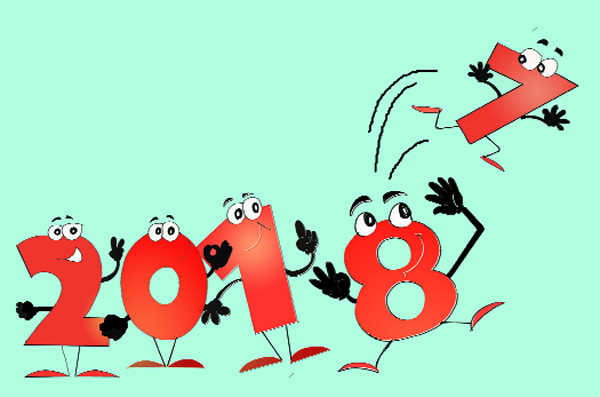Tonight, we bid goodbye to 2017. The closure of a year, year after year, inevitably comes with that same mixed feeling: doing the tango with liberal dollops of nostalgia-laden joys and deep regrets are heaps of hope and eternal expectancy, tinged with the fear of the unknown. Despite some doses of despondency, cheerfulness rooting from optimism seems to fill the air. Any pragmatic what’s-so-special-about-today,-it’s-just-another-day thought is quickly defenestrated by the merriment all around.
You contemplate the highs and lows that marked your 365 days gone by. The self-evaluation of your performance leaves you quite like that nervous anxiety-ridden child of school days when your teacher handed out the report card to you, listing your year-long academic record and behaviour at the conclusion of the session. The difference being that on New Year’s Eve, it is you who are appraising yourself: you gaze into the mirror of the preceding 12 months: you are grateful for all that life offered you; the sadness and laments are tempered by the confident hope of a better tomorrow; you promise yourself a better 2018.
As the retrospective reel plays peek-a-boo with the prospective of the New Year, you repeat, restore and renew the resolves rendered in disrepair in preceding period, all the while repressing the rise of cynicism. Hopefully, you are not quite in the shoes of this guy who says:
My goal for 2018 is to….
Accomplish the goals of 2017 which I should have done in 2016 because I promised them in 2105 and planned in 2014.
Jokes apart, goodbyes and farewells are always difficult. Perhaps, that’s why the way we say them — interestingly, the world over — involves the invocation of God, or something similar. Let’s visit some of the familiar ones, beginning with the good ol’ goodbye itself.
Goodbye, first recorded in the 1500s, comes from Ye Olde English. It was initially called godbwye, which is a contraction of “God be with you” in various forms: God be wy you, God b’uy, God buoye, etc. A century later, the effect of the popular salutations good morning and good evening rubbed off on godbwye, turning the god (in godbwye) to good, and making it ‘goodbye’.
Then, of course we have our respectful greeting Namaste or namaskar, done in Pranamasana — with palms pressed together. In Hindi, it means “I bow to the divine in you.” In Punjab, we traditionally greet one another with “Sat Sri Akal” (Sat, from Sanskrit, means truth, Sri is great, Akal is Timeless Being, ie God). It is the second half of the Sikh war cry, “Jo Bole So Nihal, Sat Sri Akal”, meaning roughly, “Blessed is the person who says ‘God is Truth’.” Some Sikhs say the salutation ‘Waheguru Ji Ka Khalsa, Waheguru Ji Ki Fateh’, that can be translated as “The Khalsa belongs to God, Victory belongs to God.”
Muslims generally hail each other with the Arabic greeting “As-Salaam-Alaikum”, meaning “Peace be unto you” and the standard response “Wa-Alaikum-Salaam” means “And unto you peace”. Some simply say ‘salaam’ as salutation. Imbued with peace and many more positive sentiments is ‘Shalom’, the Hebrew for greeting or goodbye. The word means “peace, well-being, wholeness, harmony, prosperity, and tranquility.” Notably, since shalom is also a word that references God in its deepest sense, it is forbidden to be used in bathhouses or restrooms.
Because of a popular Bollywood number, the Japanese way of wishing goodbye —’Sayonara’ — is well known to us Indians. But did you know that this musical sounding word (to us Indians) has the solemnity of a parting intended to be final or long-term? It means “if it is to be that way”.
Similarly, the French adieu, and Spanish adios (literally ‘to god’, dios being ‘God’) carry a slightly more formal and permanent kind of weight. And, if goodbyes are not quite your cup of tea, you could go with the French ‘au revoir’, meaning ‘see you again’. Just as in “see you” or “so long”. By the way, some linguists believe that “so long” came from Ireland’s goodbye “slan”. The Gaelic ‘slan’ alludes to ‘safety’.
Another salutation that can be safely used the world over is the Italian “ciao” since today it has entered the vocabulary of English and of many other languages around the world. But the roots of this word bear a culture of old Europe. The word derives from the Venetian phrase s-ciào vostro or s-ciào su literally meaning “I am your slave”. Analogous to the medieval Latin ‘Servus’, the expression was a perfunctory promise of goodwill among friends (along the lines of “at your service” in English). It derives from Medieval Latin sclavus, deriving from the ethnic “Slavic”, since most of the slaves came from the Balkans.
Well, well! As we sit on the cusp of 2018, the transition to the New Year would do us good if we gain from the wisdom of these greetings that we generally and commonly utter without realising the depth of their meanings. It reminds me of William Bridges, who has in his book ‘Transitions’ said that all our endings and beginnings are joined by an “empty or fallow time in between,” and that this “neutral zone provides access to an angle of vision on life that one can get nowhere else. And it is a succession of such views over a lifetime that produces wisdom.”
A healthy, wealthy and wise 2018 to you all!
hkhetal@gmail.com
Unlock Exclusive Insights with The Tribune Premium
Take your experience further with Premium access.
Thought-provoking Opinions, Expert Analysis, In-depth Insights and other Member Only Benefits
Already a Member? Sign In Now










